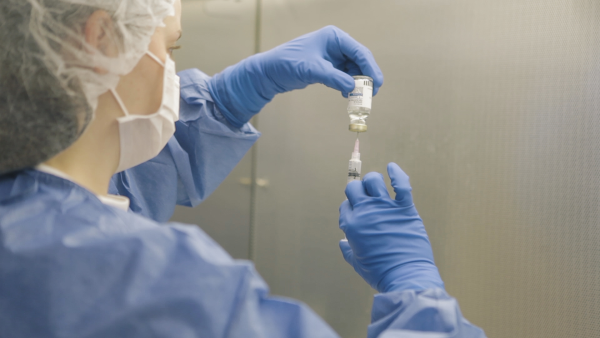CCPR preparing to make its programmatic debut

VCU School of Pharmacy’s Center for Compounding Practice and Research has completed its first phase, says director Barbara Exum: successfully launching the transition of second- and third-year Pharm.D. students “in gaining hands-on experience in our state-of-the-art sterile compounding facility.”
Phase 2, she notes, is building off of Phase 1 to include training opportunities in sterile and nonsterile compounding for professionals such as pharmacists, pharmacy technicians, nurses, regulatory inspectors and more.
In preparation for this second phase, the CCPR recently tested itself … and the results will be obvious in its future programming.
Exum explains that the goal of a three-day program held in March “was to have a diverse group to test-drive our presentation.” To that end, participants included three pharmacists and two technicians from VCU Health Department of Pharmacy, two Pharm.D. students who work as technicians for Rx3 Compounding Pharmacy, and a third Pharm.D. student who has retail experience.
Exum led the curriculum along with CCPR assistant director Quamrun Masuda, Ph.D.; Angela Cassano, Pharm.D., founder and president of Pharmfusion; and Zahra Abbud, Pharm.D., a clinical infusion pharmacist.
The course, titled “Sterile Compounding and Aseptic Processing for Nonhazardous and Hazardous Drugs,” included hands-on training in areas such as sterile compounding for IV antibiotics, ophthalmic and large- and small-volume parenterals.
“It allowed us to fine-tune our program,” Exum explained, “and to rehearse the basic prep for training and working within the center.”
Exum is an alum of the School of Pharmacy (B.S. ’82, Pharm.D. ’86) as is Daniel Phipps (Pharm.D. ’04), who took part in the pilot program. An IV coordinator for VCU Health’s Department of Pharmacy, he said the course provided “a great opportunity to learn/clarify difficult compliance issues surrounding USP 797 and USP 800.”
Benefits of the course, he said, included the opportunity to bridge the gap between academics and practice, to engage in frank discussion with others who deal with compliance challenges and to gain a regulatory/academic perspective to guide these discussions and provide insight into regulatory intent.
“This provides an important opportunity for individuals from all levels of practice to engage on this issues,” Phipps said, “and come to a shared understanding of the challenges and opportunities afforded compliance activities.
“This Is vital, moving forward, because no changes to the standard of practice are going to take hold without buy-in and understanding from all stakeholders in the profession. Standards are not useful if they are only on paper, and standards cannot reach their full potential without input and feedback from the practice level.”
Exum notes that the CCPR team is making plans to offer this program as well as an inaugural USP 800 program in June. (USP 800 is tentatively scheduled for June 10, so stay tuned!)
Phipps noted that future CCPR participants will enjoy the advantages of professional networking and hands-on compounding experience in a state-of-the-art facility.
Daniel Phipps, an IV coordinator, prepares for hands-on experience in sterile compounding.
Categories Alumni news, Faculty news, Preceptors, Student news
